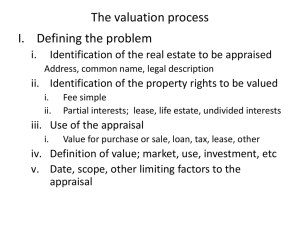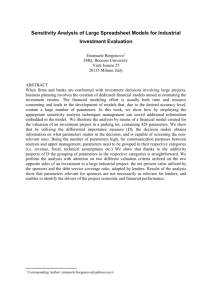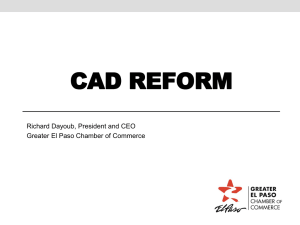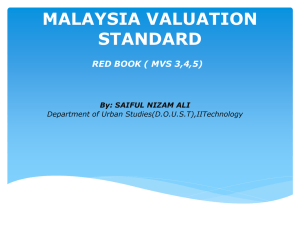1. Land Valuation in Greece
advertisement
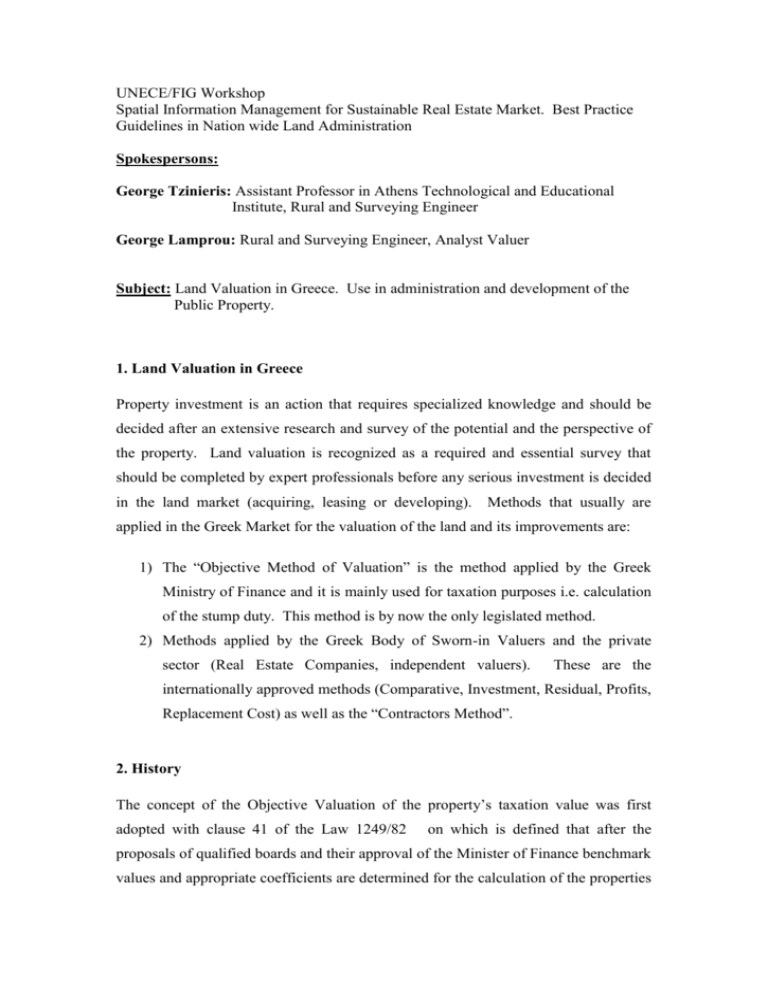
UNECE/FIG Workshop Spatial Information Management for Sustainable Real Estate Market. Best Practice Guidelines in Nation wide Land Administration Spokespersons: George Tzinieris: Assistant Professor in Athens Technological and Educational Institute, Rural and Surveying Engineer George Lamprou: Rural and Surveying Engineer, Analyst Valuer Subject: Land Valuation in Greece. Use in administration and development of the Public Property. 1. Land Valuation in Greece Property investment is an action that requires specialized knowledge and should be decided after an extensive research and survey of the potential and the perspective of the property. Land valuation is recognized as a required and essential survey that should be completed by expert professionals before any serious investment is decided in the land market (acquiring, leasing or developing). Methods that usually are applied in the Greek Market for the valuation of the land and its improvements are: 1) The “Objective Method of Valuation” is the method applied by the Greek Ministry of Finance and it is mainly used for taxation purposes i.e. calculation of the stump duty. This method is by now the only legislated method. 2) Methods applied by the Greek Body of Sworn-in Valuers and the private sector (Real Estate Companies, independent valuers). These are the internationally approved methods (Comparative, Investment, Residual, Profits, Replacement Cost) as well as the “Contractors Method”. 2. History The concept of the Objective Valuation of the property’s taxation value was first adopted with clause 41 of the Law 1249/82 on which is defined that after the proposals of qualified boards and their approval of the Minister of Finance benchmark values and appropriate coefficients are determined for the calculation of the properties values. The method is used for the valuation of inside or outside urban designated areas properties. The Objective Method of Valuation, for the inside urban designated areas, was introduced in the year 1985 and was firstly applied in the area of greater Athens. Later on, there were changes and improvements on the general concept and the method expanded on numerous Municipalities and Communities. From the 30.10.1996 there was a significant improvement as buildings that were on areas that the Objective Method of Valuation wasn’t applicable for the land as well special buildings were able to be valued according to the “Objective Criteria”. For these purposes benchmark values were defined for each building type that were readjusted on the 02.07.2001. On the 04.01.1999 started the application of the Objective Valuation Method for properties situated outside urban designated areas in four prefectures (Argolida, Grevena, Larissa and Kastoria). For this application a special sheet of valuation was introduced and Basic Prices were adopted in a Municipality based system. This method is now expanded throughout Greece and a readjustment of the Basic Prices is expected. On the paragraph 18 of the clause 14 of the Law 1882/1990 is outlined that Basic Prices should be readjusted every two years but this is not an obligatory guideline. The boards that are established through the clause 41 of the Law 1249/1982, are staffed with the Managers of the local Tax Offices, Surveyors of the Ministry of Environment and the Technical Chamber of Greece as well as representatives of the local authorities. 3. Application Field The Objective Valuation Method applies nowadays in every outside urban designated area of the country, besides these that specific building regulations are in use and in the 60% of the inside urban designated areas. The latest readjustment of the values was on the 05.03.2001. From the beginning of the method there was an informal way of determining the objective value as a percentage of the market value of the property that was specified at around 70%. Following this way of determining the values there was a significant range of misleading values that in some cases were representing the 1/5 of the corresponding market values. In the last three years the Ministry of Finance is trying to converge the objective values with the market values. 4. Conclusions and Intricacies from the application of the method There is a number of facts that were concluded from the 18 years that the Objective Method of Valuation is used. The local boards are staffed inefficiently in quantity and quality. That leads to important delays and/or undocumented results. The proposals do not often result from extensive research but are usually opinions that target to the personal or the local benefit and are indicated by the local unions and authorities. The lack of automation and computerization of the system makes the procedure time consuming and the sensitive schedules cannot be maintained 5. Suggestions on the method What should we do in order to help the sufficiency of the method? The sources of the comparable evidence that would comprise the input of the system should be determined and be used in a way that will help the method to strive and approach the market values. The departments and the organizations that will collect the relevant data should be determined and the procedure must be patterned in a way that sufficiency and time issues will be solved. A database that would provide the system with all the relevant and required information should be created and its continuous updating should be ensured. On a final stage the scope of the work must be the enrichment of the system and the database with secondary data (rental values, capitalization rate, yields etc.) Additionally and according to our opinion it is necessary the preparation of the legal frame that will define the outline and standardize the way that land valuation will be applied by the introduction of the statute of a Property Surveyor – Valuer as well as his/hers required qualifications. The Hellenic Association of Rural and Surveying Engineers and the Greek Technical Chamber should initiate and promote the necessary procedures given that Engineers and specifically Rural Surveying Engineers are by fact these who are “spatial oriented” and these who have the adequate knowledge of topography, town and urban planning as well as law and are the most appropriate for carrying over Land Valuation projects that will assist in the development and will guide in the lucid application of the land valuation methods for a new land administration policy. 6. Use of the land valuation in administration and development of the Public Property. As far as the Greek Market is concerned and the perspectives for Real Estate evaluation, it should be a main concern of the Greek Public Sector, which should manage and use properly the Public property. This is on the one hand the Public Properties (private property) and on the other hand the Coastal and Beach Zone and Former Coastal Zone (common used area). Since 1995 the political leadership of the Treasury Department had intimated to the proper Minister of Environment, Spatial Planning and Public Works relevant positions: 1) The legal status which concerns the Public Property and the adjustments that have to be concluded, taking into account the materialization of the National Cadastral. 2) The necessary elements, for practicing a public and an economic policy, which have to be included in the National Cadastral and under the realistic dogma that public land management and use have on the one hand to secure the interests of the public sector and on the other hand to insure the rights of the private sector providing solution in long lasting owning problems. So, as it is obvious we are facing an unequal civilian treatment which makes the arrangement of the existing public land policy necessary, in order to solve social problems that have been tolerated or even caused by the incapability and the omissions of the state. This enclosed the danger of the public property becoming the victim of the National Cadastral. Maybe this can be confirmed by the recently voted law 3127/2003 (F.E.K 67A/19-03-2003). By official governmental sources and the introductive essay of law 2308/95 for the Cadastral they were referring that this is the way to reveal the public land which was estimated to 300,000,000e (we believe that the amount is multiple) and that there will be many benefits which seem to be undermined by the recently voted law which we referred to.( law 3127/2003 ). All of the above required a political decision and close cooperation among services and agents that was never achieved or that was never meant to be achieved. Making use of the Public property is being done by the Public Property Administration and the Land Services of each Prefecture of the Treasury Department, KED( Public Land Company), NPDD(Legal Agent of Public Law), Banks controlled by the Public Sector, E.T.A (Company of Tourism Development), O.T.A.(Local Administration Organization) and so on.. The other part of the Greek Public Sector the use of which presents a deep interest is the Coastal and Beach Zone and Former Coastal Zone. Greece, considering with other countries, is the country with the larger coastal and island scenery, the length of which is approximately 18.000 km, from which the 7.000 km correspond to the 3.053 islands. Greece, along with Norway, presents the largest proportion of length per km square of land. (118 meter per km square of land.) This sum corresponds to 5, 5 times the length of the French coasts and the 7/10 of the total sum of the African Continent coasts. If we consider as average depth of land, that is affected by coasts the depth of 6-8 km, then by the National Statistic Service data we can conclude the following in relation to this zone: 1). The population density is 143 habitants per km square, which is double than the country’s total (78 habitants per km square). 2). This zone concentrates the 65% of the industrialized power, over 150 hp and the 80 out of 100 based on the occupation level. 3). This zone covers 48.000 km squares of land, which corresponds to 34% of the country’s total area. 4). The Municipalities and Communities that are situated in this zone are 40% of the total that belong to the administration of 43 out of the 54 prefectures. 5). Historical, societal and financial aspects have lead to an intense gathering of activities into this zone with destructive consequences for the environment. As a result, in the 48.000 km squares (34% of the country’s total) the concentration of population is 7.000.000 people, which is 68% of the country’s population. Furthermore, the visitors and tourists especially during the summer are an other 4.000.000 individuals. So, since the after war years we are facing a distorted development that has to be changed and has to follow the steps of a kind of development that respects the environment, the nature and having as a point of reference the sustainability. In order to achieve such a development we should have the Maximum Objective Approach of the Market’s prices or the most precise knowledge of the inclination of the objective prices and the market’s prices, so that the reliability of the system would be increased and imposed. Somehow, it would be possible for it to become a tool and a guide for defining the value of the Land, a procedure that concerns the Treasury Department, the Public Exchangeable Properties, Legacies and so on… Within this framework, it could be possible for example making use of the system of Objective Designation either directly or after an auction granting of the use of coastal and beach zone, or during the leasing of Public Sector Property. It is being said that the payments are low (especially those of KED- Public Land Company), since there is no procedure of Objective Evaluation. As far as the coast is concerned, the exchange or the initial price of the auction could be designated by the use of Objective Values of the adjacent coastal properties and by using the revenue method respectfully adjusted. By this way, the phenomenon of the arbitrary and contradictory evaluations will be distinguished; there will be transparency and unified-equal treatment of the civilians and finally at the level of possible; Control- Knowledge of the prices of the Real Estate Market at the Coastal Zone.



